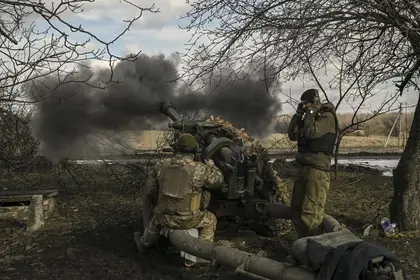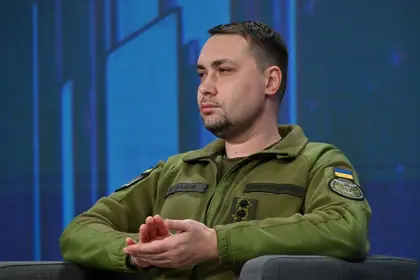The situation in Bakhmut remains tense on Sunday, with Ukraine still holding firm but Russia making limited advances and gaining what analysts have described as a “positional advantage”.
Is Russia poised to encircle Bakhmut?
JOIN US ON TELEGRAM
Follow our coverage of the war on the @Kyivpost_official.
According to the Washington-based Institute for the Study of War (ISW), Russian forces made one limited confirmed advance near Bakhmut on March 4 but “will likely not be able to encircle the city soon”, though the situation is still perilous for Ukraine.
The ISW reports that Russia could be in a position to conduct a “turning movement against certain parts of Bakhmut”, which it goes on to explain: “The purpose of a turning movement is to force the enemy to abandon prepared defensive positions and is different from the aim of an encirclement, which is to trap and destroy enemy forces.”
On Saturday, the ISW and the British Ministry of Defence both noted that Ukraine had blown up two bridges including a vital bridge connecting the city to the last main supply route from Bakhmut to the city of Chasiv Yar.
The ISW said this appeared to be setting conditions for a “controlled fighting withdrawal from parts of Bakhmut.”
At this time it is unclear if Ukrainian commanders have decided to withdraw or not though they have signaled they will likely withdraw rather than risk an encirclement.
The ISW concludes: “(We) assess that Ukrainian forces are far more likely to withdraw than to become encircled and that the Ukrainians might still be able to hold their positions in Bakhmut if they choose to try.

British Defence Intelligence Update Ukraine 27 January 2025
“Russian forces have been suffering high casualties in these advances, and Ukrainian commanders’ assessments of the likelihood that they can force Russian attacks to culminate near or behind their current positions balanced against the risk of losing access to essential withdrawal routes will likely guide the Ukrainian decision to stay or pull back.”
So Ukraine is still fighting for Bakhmut?
Absolutely. The Ukrainian general staff said on Sunday morning that "more than 130 enemy attacks" had been repelled over the past day including in Kupiansk, Lyman, Bakhmut and Avdiivka.
"The enemy continues its attempts to encircle the town of Bakhmut."
Sergiy Cherevaty, a spokesman for Ukrainian forces, said on Saturday the situation was "difficult but under control" in the city he described as a "priority target for the enemy".
Ukrainian military analyst Oleh Zhdanov said in a YouTube interview on Saturday night that he sees no sign of an imminent retreat by Ukraine.
He added: “At the moment the situation is more or less stabilized. In terms of the advancement of Russian troops, we practically stopped it.”
Has President Zelensky commented on the fighting?
During his daily address on Saturday, President Zelensky gave no details about the situation but praised his forces, saying: “I will especially note the fighters who defend Bakhmut.
“In particular, soldiers of the 56th separate motorized infantry brigade, the 67th and 93rd separate mechanized brigades, and the 77th separate airborne brigade.
“Thank you, guys! Glory to all Ukrainian heroes!”
What has Russia said?
The Kremlin has not commented directly on the current situation in Bakhmut but Russia's defence ministry has made a big show of its minister Sergei Shoigu inspecting troops in occupied eastern Ukraine.
It put out a rare video of Shoigu travelling in a helicopter and talking to a soldier in front of damaged buildings.
Shoigu handed state awards to servicemen and held a meeting with his deputies "on organising the uninterrupted provision of troops with armaments, military hardware and ordnance", his ministry later said.
What about Wagner?
This is where it gets even more interesting – only this Friday, Wagner chief Yevgeny Prigozhin boasted in a video posted to telegram that his forces had “practically surrounded” Bakhmut and called on President Zelensky to “let (Ukrainian soldiers) leave”.
Yet just a day later on Saturday he released another video lamenting how disastrous a Wagner retreat would be for Russia.
He said: “If PMC Wagner retreats right from Bakhmut now, the whole front will collapse. And today Wagner acts as cement. On one hand, we pull all the Ukrainian groupings on ourselves, grind it, destroy it, not allowing it to concentrate in other areas of the front.
“If Wagner PMC pulls back now, history will unfold in the following way – the front will collapse to the Russian borders, perhaps even further. And generally, the situation will be unpleasant for all military formations protesting Russia’s interests.
“If we pull back, we will forever go into history as the people made the main step towards losing the war.”
What does that mean?
It’s not exactly clear at the present time although Wagner and the Kremlin have been locked in a long-running battle for influence and glory in the fight for Bakhmut and it’s possible the purpose of the video is to hammer home Wagner’s role in what Moscow will claim as a massive victory.
UPDATE: It has since been reported that the above video was recorded two weeks ago but its surfacing yesterday has led to calls from a prominent miliblogger for Prigozhin to be removed from his position.
What’s the bigger picture?
The situation in Bakhmut is undoubtedly awful but it’s worth remembering that this time last year Russia was intending to capture Kyiv and take over all of Ukraine.
One year on, and they’re losing thousands of troops to capture one city in eastern Ukraine, the military significance of which has been heavily questioned.
Bakhmut, a small industrial city in eastern Ukraine known for its salt mines, used to be home to some 70,000 inhabitants before troops sent by President Vladimir Putin invaded the country on February 24 last year.
Months of artillery fire largely reduced the city to rubble and forced most of its residents to flee. Those remaining were forced to hide in basements, only venturing out for essential food and fuel, AFP reports.
On the frontline, Moscow and the Wagner mercenary group sent wave after wave of ill-prepared recruits to their death, Ukrainian soldiers say, describing them as "cannon fodder". Many soldiers are also believed to have died on the Ukrainian side.
Western sources estimate that hundreds each day were wounded or lost their lives.
The violence moreover caused casualties among the few thousand civilians remaining in the city, and the Ukrainian and foreign volunteers risked their lives to help them.
But the city is of little to no strategic importance, analysts say. Ukraine's President Volodymyr Zelensky said so himself in an interview with French newspaper Le Figaro published in early February.
"Strategically, Bakhmut is of little importance as the Russians have entirely destroyed the city with their artillery," he said.
Retired Australian major general Mick Ryan, of the US-based Center for Strategic and International Studies, said Bakhmut was "not an inherently valuable military target".
"The battle of Bakhmut... has absorbed massive military and human resources," he said.
"This investment is out of all proportion to the importance of the city." Belgian military analyst Joseph Henrotin said the city had become a fixation for both sides, but had only served to "mutually degrade their potential".
"Since December, the Russians have been trying to whittle down Ukrainian capacity by forcing them to deploy forces all over the place and preventing them from concentrating in one area to enable a breakthrough," he said.
But "Bakhmut is just one piece of the puzzle. Its fall will mean nothing if other positions hold". Its capture could possibly allow the Russians to try to advance westwards towards Kramatorsk, but that city was well defended, he added.
You can also highlight the text and press Ctrl + Enter










